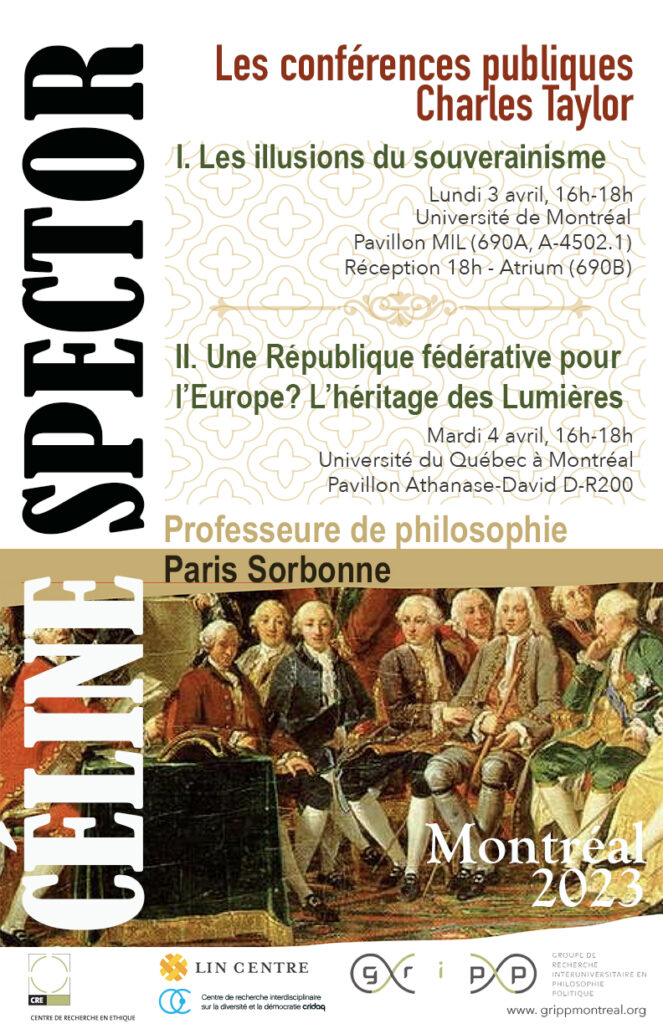THE 2025 ANNUAL GRIPP MONTREAL POLITICAL THEORY MANUSCRIPT WORKSHOP AWARD
Call for applications: The Groupe de recherche interuniversitaire en philosophie politique de Montréal (GRIPP), spanning the departments of political science and philosophy at McGill University, l’Université de Montréal, Concordia University, and l’Université du Québec à Montréal, invites applications for its 2025 manuscript workshop award. The recipient of the award will be invited to Montreal for a day-long workshop expected to be held in May 2025 dedicated to their book manuscript. This “author meets critics” workshop will comprise four to five sessions dedicated to critical discussion of the manuscript; each session will begin with a critical commentary on a section of the manuscript by a political theorist or philosopher who is part of Montreal’s GRIPP community. The format is designed to maximize feedback for a book-in-progress. The award covers the costs of travel, accommodation, and meals.
Eligibility: The manuscript topic is open within political theory and political philosophy. Book manuscripts in English or French, not yet in a version accepted for publication, by applicants with PhD in hand by 1 August 2024, are eligible. In the case of co-authored manuscripts, only one of the co-authors is eligible to apply. One the one hand, applicants must have a complete or nearly complete draft (at least 4/5 of final draft) ready to present at the workshop. On the other hand, only works in progress by the workshop date are eligible. Authors with a preliminary book contract are eligible only if the deadline for submitting the manuscript’s final, revised version to the publisher is well enough after the workshop date to allow for revisions after the workshop.
Application: Please submit the following materials electronically, compiled as a single PDF file, in the following order:
- a curriculum vitae;
- a table of contents;
- a short abstract of the book project, up to 200 words;
- a longer book abstract up to 2500 words; and,
- in the case of applicants with previous book publication(s), three (3) reviews, from established journals in the field, of the applicant’s most recently published monograph.
Candidates are not required, but may if they wish, to have two letters of recommendation speaking to the merits of the book project submitted (either separately or appended to the PDF) as well. Please do not send writing samples. The PDF file name should be your last name followed by a space and your first name. Send materials by email, with the subject heading “2025 GRIPP Manuscript Workshop Award” to <gripp.montreal@gmail.com>. Review of applications begins 15 January 2025. Contact Jean-Félix Caron <jean-felix.caron@mcgill.ca> with questions.
Evaluation Process: The final decision for choosing the winner of the GRIPP manuscript award lies with the GRIPP Jury. The Jury will seek to meet within the first two weeks of the rolling deadline for submissions. All bilingual regular faculty members of GRIPP have the right to participate as members of the Jury. Each regular faculty member of GRIPP has the right to suggest a short-list of up to five proposals for consideration by the Jury, but the final decision rests with the Jury itself. All elements of the Jury’s deliberations are confidential; unfortunately, it is not possible for the Jury or its members to provide any feedback to applicants concerning the merits of their proposal. A full list of the regular GRIPP faculty membership is available at <http://grippmontreal.org>
Previous GRIPP Manuscript Workshops:
- February 2025*: Nicholas Southwood (ANU), Feasibility : On What is Possible in Politics (*corresponds to the 2024 award)
- May 2023: Teresa Bejan (Oxford), First Among Equals
- May 2020**: Adam Lebovitz (Cambridge), Colossus: Constitutional Theory in America and France, 1776-1799 (**cancelled due to COVID-19)
- Jan 2020: Laura Valentini (LSE), Morality and Socially Constructed Norms
- May 2018: Holly Lawford-Smith (Melbourne), Not In Their Name
- April 2017: William Selinger (Harvard), Philosophers of Parliament: The Promise and Perils of the Legislature and the Origins of Liberalism
- May 2016: Katrina Forrester (QMUL), Reinventing Morality: A History of American Political Thought since the 1950s
- August 2015: Lea Ypi (LSE) [with co-author Jonathan White (LSE)], The Meaning of Partisanship
- May 2015: Magali Bessone (Rennes 1), Réparer les injustices coloniales : Perspective transitionnelle sur la justice réparatrice
- May 2014: Paul Gowder (Iowa), A Commitment to Equality: The Rule of Law in the Real World
- May 2013: Alex Gourevitch (McMaster), Something of Slavery Still Remains: Labor and the Cooperative Commonwealth
- May 2012: Daniel Viehoff (Sheffield), The Authority of Democracy
- May 2011: James Ingram (McMaster), Radical Cosmopolitics: The Ethics and Politics of Democratic Universalism
- April 2010: Hélène Landemore (Yale), Democratic Reason: Politics, Collective Intelligence, and the Rule of the Many
- April 2009: Alan Patten (Princeton), Equal Recognition: The Moral Foundations of Minority Cultural Rights
- March 2009: Kinch Hoekstra (UC Berkeley), Thomas Hobbes and the Creation of Order

